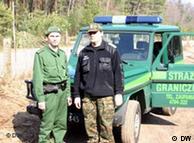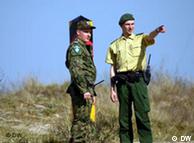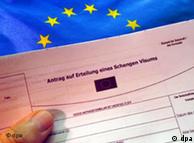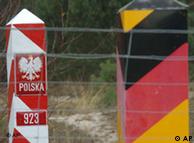European Union | 23.11.2007 /d.welle
European Union | 23.11.2007
German Police Demonstrate Against EU Border Opening
Hundreds of German police officers have demonstrated near the Polish border against the dismantling of frontier posts. They say security is threatened. Passport controls are being scrapped under the Schengen system.
Under the plans, around 1,850 officers will be withdrawn from the area when Germany's borders with Poland and the Czech Republic are completely opened on Dec. 21.
On that day, six other former Communist countries in eastern Europe as well as Malta will also join the European Union's Schengen system, which does away with passport controls at the borders of participating states.
Many Germans in the border region have expressed fears that opening the borders could lead to an influx of petty criminals, such as shoplifters, burglars and car thieves.
Reforms criticized for coming too soon
 Bildunterschrift: Großansicht des Bildes mit der Bildunterschrift: The emphasis will switch to joint mobile police patrols
Bildunterschrift: Großansicht des Bildes mit der Bildunterschrift: The emphasis will switch to joint mobile police patrols
German police carried banners saying: "Yes to Europe, no to hasty reforms," on their march on Thursday, Nov. 22, from the border to the venue of a meeting attended by Interior Minister Wolfgang Schäuble.
The head of the police union GdP, Konrad Freiberg, said in a radio interview that the opening of the border was "premature" in terms of security. He said important communication systems were not yet in place.
Schäuble rejected the claims.
"On the contrary, switching from stationary border controls to mobile border surveillance will lead to a growth in freedom and an increase in security," he said after meeting his counterpart Grzegorz Schetyna in the Baltic resort of Heringsdorf.
Schäuble stressed that the worries of the population were being taken seriously and that the move had been prepared carefully in partnership with Germany's eastern neighbors.
He said joint patrols would be intensified on both sides of the border. A German-Polish center is planned in the Polish town of Swiecko for customs and security officials.
Police unprepared?
 Bildunterschrift: Großansicht des Bildes mit der Bildunterschrift: Much closer cooperation is envisaged between Germany and its eastern neighbors
Bildunterschrift: Großansicht des Bildes mit der Bildunterschrift: Much closer cooperation is envisaged between Germany and its eastern neighbors
GdP head Freiberg also said the eastern European states did not have the same security standards as Germany and had problems with corruption, equipment and police cooperation.
In contrast, the head of German police union DpoIG, Rainer Wendt, criticized the state of the German force's equipment.
He said there were no computers in German patrol cars and no digital radios to facilitate carrying out mobile checks, and no real deployment strategy.
With the nine new Schengen members -- the Czech Republic, Estonia, Hungary, Latvia, Lithuania, Malta, Poland, Slovakia and Slovenia -- the countries covered by the accord now number 24.
Schengen facilitates freedom of movement
 Bildunterschrift: Großansicht des Bildes mit der Bildunterschrift: The moves will make travel easier for non-EU tourists
Bildunterschrift: Großansicht des Bildes mit der Bildunterschrift: The moves will make travel easier for non-EU tourists
The lifting of restrictions applies only to land and sea borders at first. Passport control at airports are to remain in place until the end of March 2008.
Named after a small village in Luxembourg where it was signed in 1985, the Schengen Agreement abolishes internal border controls among participating states.
This means people can travel from one Schengen country to another without having their passports checked, and non-EU visitors can travel to all Schengen states on a single visa.

Comments